As we age, keeping our minds sharp becomes a top concern for many of us.The truth there’s no magic pill that will turn back time and there are opposing views on the effectiveness of popular brain health supplements. But certain supplements are backed by real research. Studies show they can support brain health, memory, and focus as we get older.
This isn’t just another random list. we’ve ranked 10 of the most popular supplements based on the strength of scientific evidence from human clinical trials. You’ll learn what the research actually says about each one. That way, you can make smart choices about what might work for you.
Let’s count down from the supplement with the most solid science to those that show promise but need more study.
#1 Omega-3 Fatty Acids (DHA & EPA): The Brain’s Building Blocks
Why It’s #1: The Gold Standard for Brain Health
Omega-3s are special fats your brain needs to work well. Two types matter most: DHA and EPA. Your brain is made up of about 60% fat, and DHA is a big part of that structure.
The Evidence
A 24-week study with 485 older adults who had mild memory issues found that DHA improved their ability to learn and remember daily events compared to a placebo. This research by Yurko-Mauro and colleagues in 2010 tracked participants aged 55 and older with a score of at least 26 on cognitive tests. Those taking 900mg of DHA daily showed significant gains in episodic memory—the kind you use to remember what happened yesterday or where you parked your car.
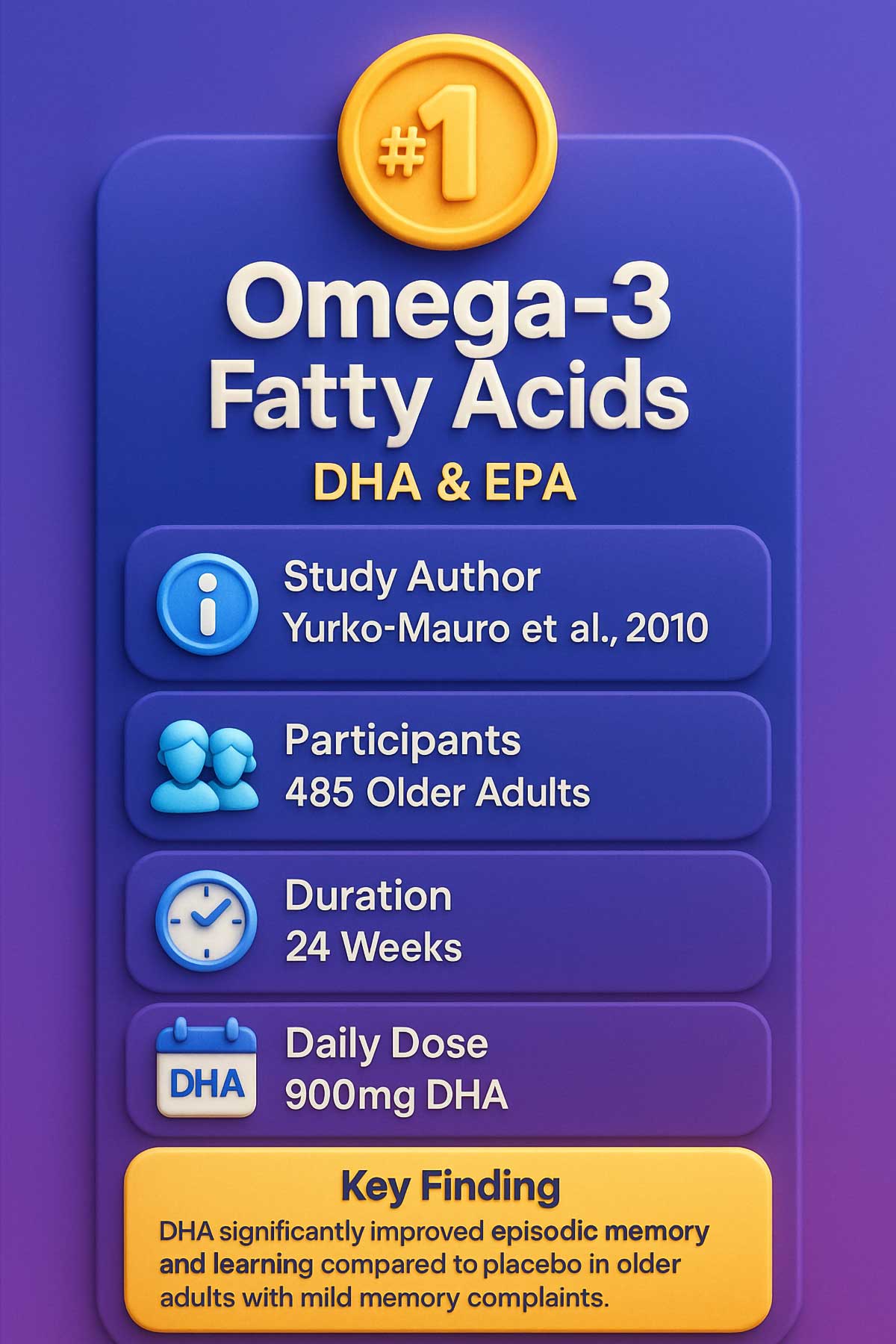
Think of DHA as the building material for your brain cells. Without enough of it, your brain can’t maintain its structure or send signals as well.
Dosage & Timing
Research-Backed Dose: 900mg DHA daily
Best Time: Morning with breakfast
With Food: Yes (improves absorption)
Duration: 8-12 weeks for noticeable effects
Safety & Precautions
Common Side Effects: Fishy aftertaste, mild stomach upset, loose stools
Avoid If You Have: Bleeding disorders, fish allergies
Drug Interactions: Blood thinners (warfarin, aspirin), may increase bleeding risk
Safe Long-Term: Yes, extensively studied for years
Quick Tip: Store omega-3 supplements in the fridge to prevent rancidity and reduce fishy burps.
What You Can Do
Get omega-3s from fatty fish like salmon, mackerel, and sardines. Aim for two servings a week. If you prefer a supplement, look for one that lists the DHA content clearly on the label. Most brain health benefits come from getting at least 900 mg of DHA daily.
Bottom Line: The most studied brain supplement with consistent results across multiple trials.
#2 B Vitamins (B6, B12, Folate): The Homocysteine Heroes
A Powerful Trio for Protecting Your Brain
These three B vitamins work as a team. They lower levels of homocysteine in your blood. High homocysteine is linked to brain shrinkage and memory problems as we age.
The Evidence
A two-year trial with 156 older adults who had mild cognitive issues showed that this B-vitamin mix slowed the rate of brain shrinkage, especially in people with high homocysteine levels. The de Jager study from 2012 tracked actual brain changes using MRI scans. Participants took 20mg of B6, 500mcg of B12, and 800mcg of folic acid daily. Those with elevated homocysteine at the start saw brain atrophy rates drop by up to 53% in certain brain regions.
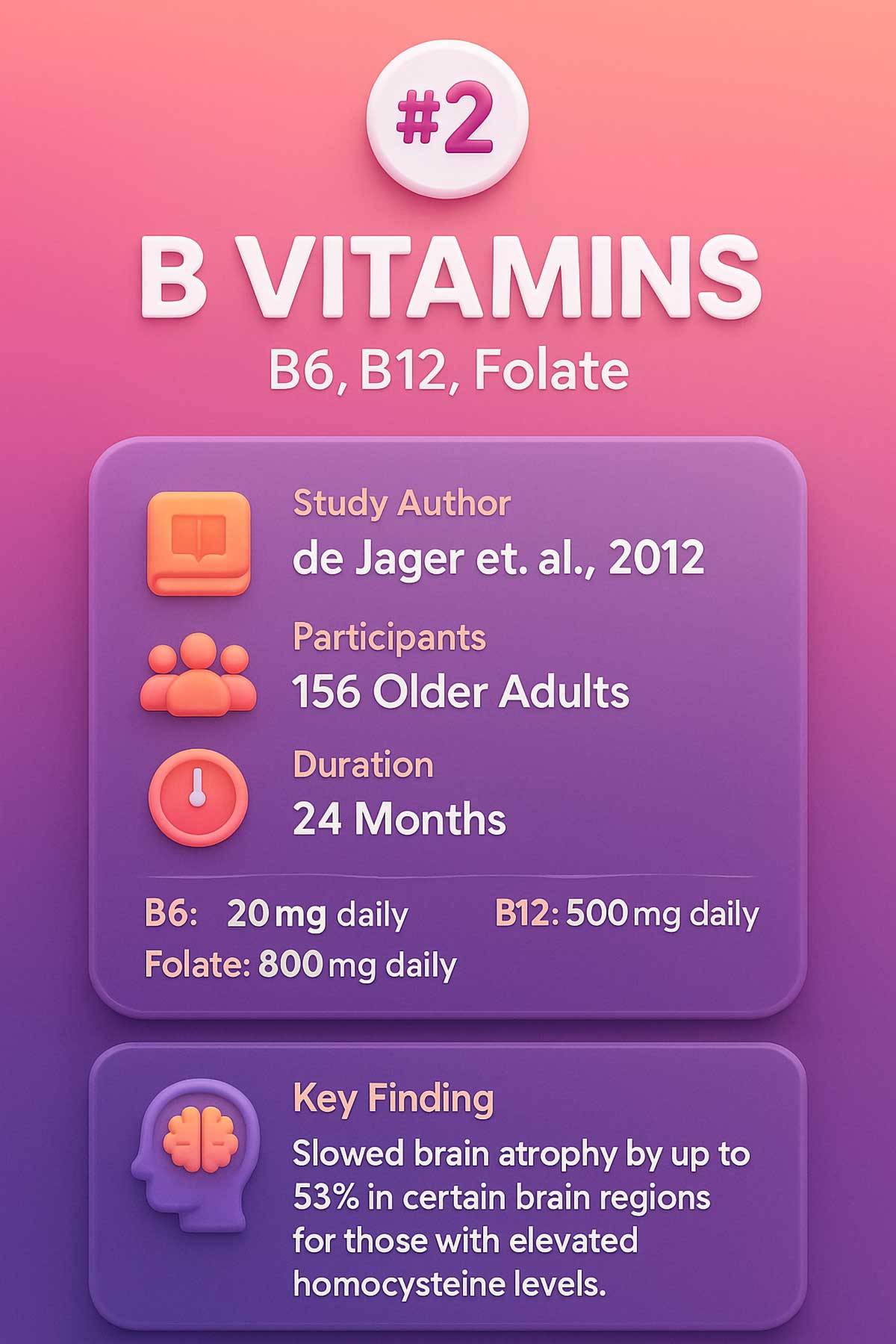
Your brain needs these vitamins to clear out homocysteine. When homocysteine builds up, it can damage blood vessels and brain cells.
Dosage & Timing
Research-Backed Dose: B6: 20mg, B12: 500mcg, Folate: 800mcg daily
Best Time: Morning with food
With Food: Yes (reduces nausea)
Duration: 3-6 months for measurable changes
Safety & Precautions
Common Side Effects: Mild nausea, urine may turn bright yellow (harmless)
Avoid If You Have: Active cancer (high-dose folate may be problematic)
Drug Interactions: Certain seizure meds, methotrexate
Safe Long-Term: Yes, water-soluble vitamins
Did You Know?: About 15% of adults over 60 are deficient in B12 because stomach acid decreases with age, making it harder to absorb from food.
What You Can Do
Ask your doctor to check your homocysteine levels with a simple blood test. If yours are high, this supplement combo could help a lot. B vitamins are found in meat, eggs, and leafy greens, but many older adults don’t absorb them well from food anymore.
Bottom Line: Most effective for those with elevated homocysteine; get tested first.
#3 Phosphatidylserine: The Cell Communicator
Enhancing Memory and Mental Clarity
Phosphatidylserine is a fatty substance that covers brain cells. It helps them stay healthy and talk to each other. As we age, we have less of it in our brains.
The Evidence
In a 12-week trial of 149 people with age-related memory loss, phosphatidylserine improved their ability to learn and recall daily tasks. This 1991 study by Crook and his team gave participants 300mg daily. Those under age 75 showed the best results, with improvements in matching names to faces and recalling phone numbers and misplaced objects.
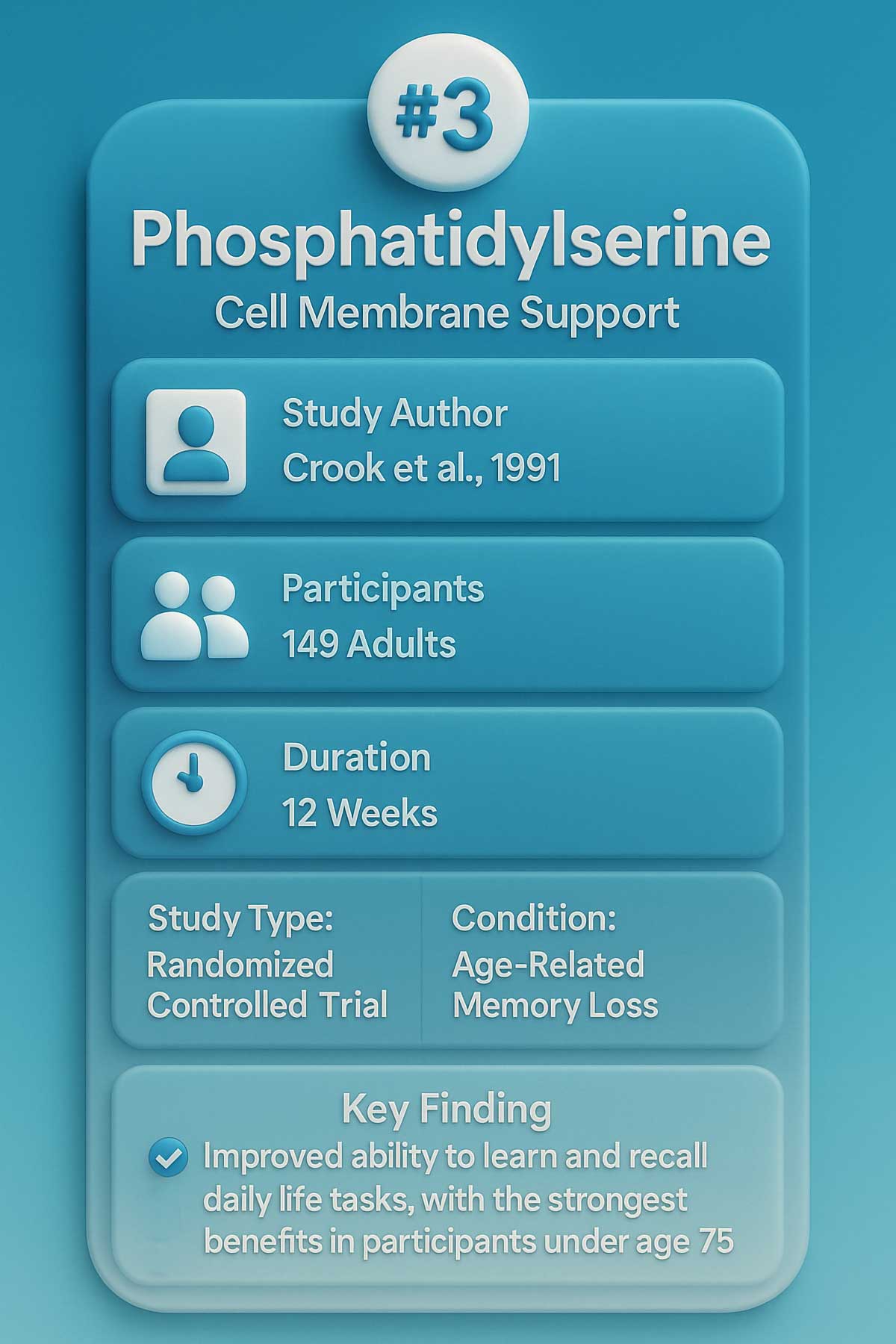
Picture phosphatidylserine as the wrapper around each brain cell. It keeps the cell protected and makes sure messages get through clearly.
Dosage & Timing
Research-Backed Dose: 300mg daily (often split into 100mg three times)
Best Time: With meals throughout the day
With Food: Yes
Duration: 4-8 weeks for noticeable effects
Safety & Precautions
Common Side Effects: Mild insomnia if taken late, stomach upset
Avoid If You Have: No major contraindications
Drug Interactions: May enhance effects of certain Alzheimer’s drugs
Safe Long-Term: Yes, naturally present in the body
Quick Tip: If you notice sleep issues, take your last dose no later than 4 PM.
What You Can Do
This supplement used to come from cow brains. Now it’s made from soy or sunflower. Look for 100-300 mg per day. Some people notice better focus within a few weeks.
Bottom Line: Solid evidence for everyday memory tasks; works best for those under 75.
#4 Ginkgo Biloba Extract (EGb 761): The Circulation Enhancer
A Traditional Herb with Modern Backing
Ginkgo has been used in Chinese medicine for ages. The specific extract called EGb 761 has been studied the most. It may help blood flow to the brain.
The Evidence
A large review of 21 trials with over 2,600 people found that Ginkgo biloba extract improved thinking skills and daily activities in those with mild cognitive issues. This 2015 meta-analysis by Tan and colleagues combined data from studies lasting 12 to 52 weeks. The standardized EGb 761 extract showed benefits for cognition and activities of daily living, though results were more modest in people with normal cognition.

Better blood flow means more oxygen and nutrients reach your brain cells. That can help with memory and focus.
Dosage & Timing
Research-Backed Dose: 120-240mg daily (split into two doses)
Best Time: Morning and early afternoon
With Food: Not required but may reduce stomach upset
Duration: 8-12 weeks for noticeable effects
Safety & Precautions
Common Side Effects: Headache, dizziness, stomach upset
Avoid If You Have: Bleeding disorders, upcoming surgery
Drug Interactions: Blood thinners, NSAIDs, certain antidepressants
Safe Long-Term: Generally yes, but monitor with doctor
Warning: Stop taking ginkgo at least 2 weeks before any scheduled surgery due to bleeding risk.
What You Can Do
Not all Ginkgo is the same. Look for products that say “EGb 761” on the label. That’s the form used in most research. Take 120-240 mg daily, split into two doses.
Bottom Line: Best for those with mild cognitive issues rather than prevention in healthy adults.
#5 Citicoline (CDP-Choline): The Focus Fuel
Powering Up Your Attention and Verbal Memory
Citicoline is a brain chemical that your body uses to make acetylcholine. Acetylcholine is a key signal carrier for memory and learning.
The Evidence
A 9-month trial found that citicoline improved attention and the ability to remember words in older adults with memory concerns. The 1999 study by Alvarez included 95 participants with age-related memory issues. Those taking citicoline showed better performance on tests of attention span and verbal memory compared to placebo. The benefits appeared within the first few months and continued throughout the study.
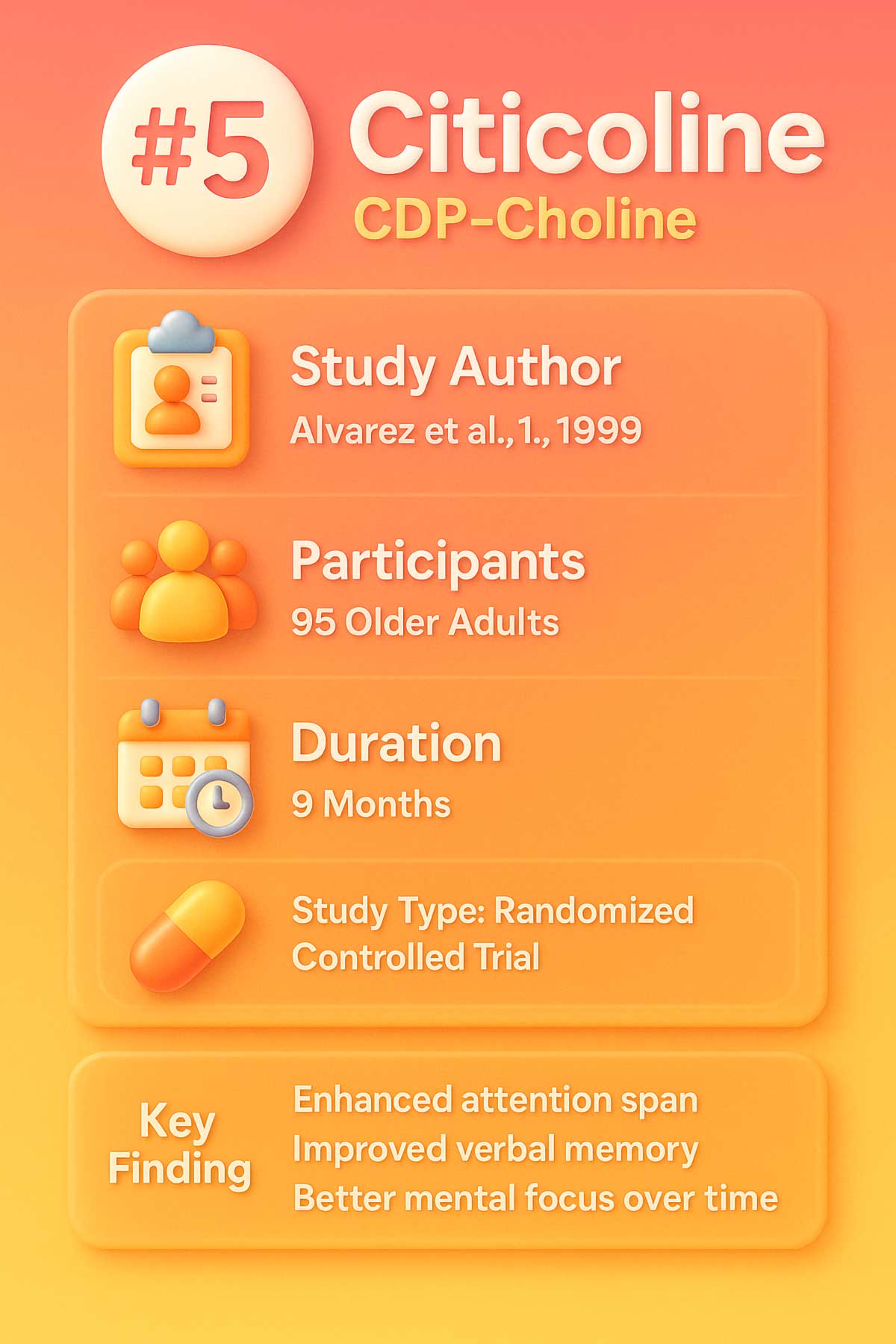
Think of citicoline as fuel for your brain’s signal system. More fuel means clearer, faster thinking.
Dosage & Timing
Research-Backed Dose: 250-500mg daily (some studies used up to 1,000mg)
Best Time: Morning
With Food: Not required
Duration: 4-6 weeks for noticeable effects
Safety & Precautions
Common Side Effects: Headache, insomnia (if taken late), stomach upset
Avoid If You Have: No major contraindications
Drug Interactions: May enhance effects of Parkinson’s medications (levodopa)
Safe Long-Term: Yes, naturally occurs in the body
Quick Tip: Start with 250mg to assess tolerance before increasing to higher doses.
What You Can Do
If you struggle with focus or mental energy, citicoline might help. Look for 250-500 mg per day. Some people feel more alert within a few days.
Bottom Line: Great for focus and mental energy; effects often noticed quickly.
#6 Bacopa Monnieri: The Ayurvedic Adaptogen
An Ancient Herb for Learning and Reduced Anxiety
Bacopa is a plant used in Indian medicine for hundreds of years. It’s known for helping with memory and calming the mind.
The Evidence
A 12-week trial with 62 older adults showed that Bacopa improved their ability to learn words, remember things, and pay attention. The 2008 study by Calabrese gave participants 300mg daily of a standardized extract. Beyond cognitive benefits, the study also found reductions in anxiety and depression scores, suggesting Bacopa offers mood support alongside memory enhancement.
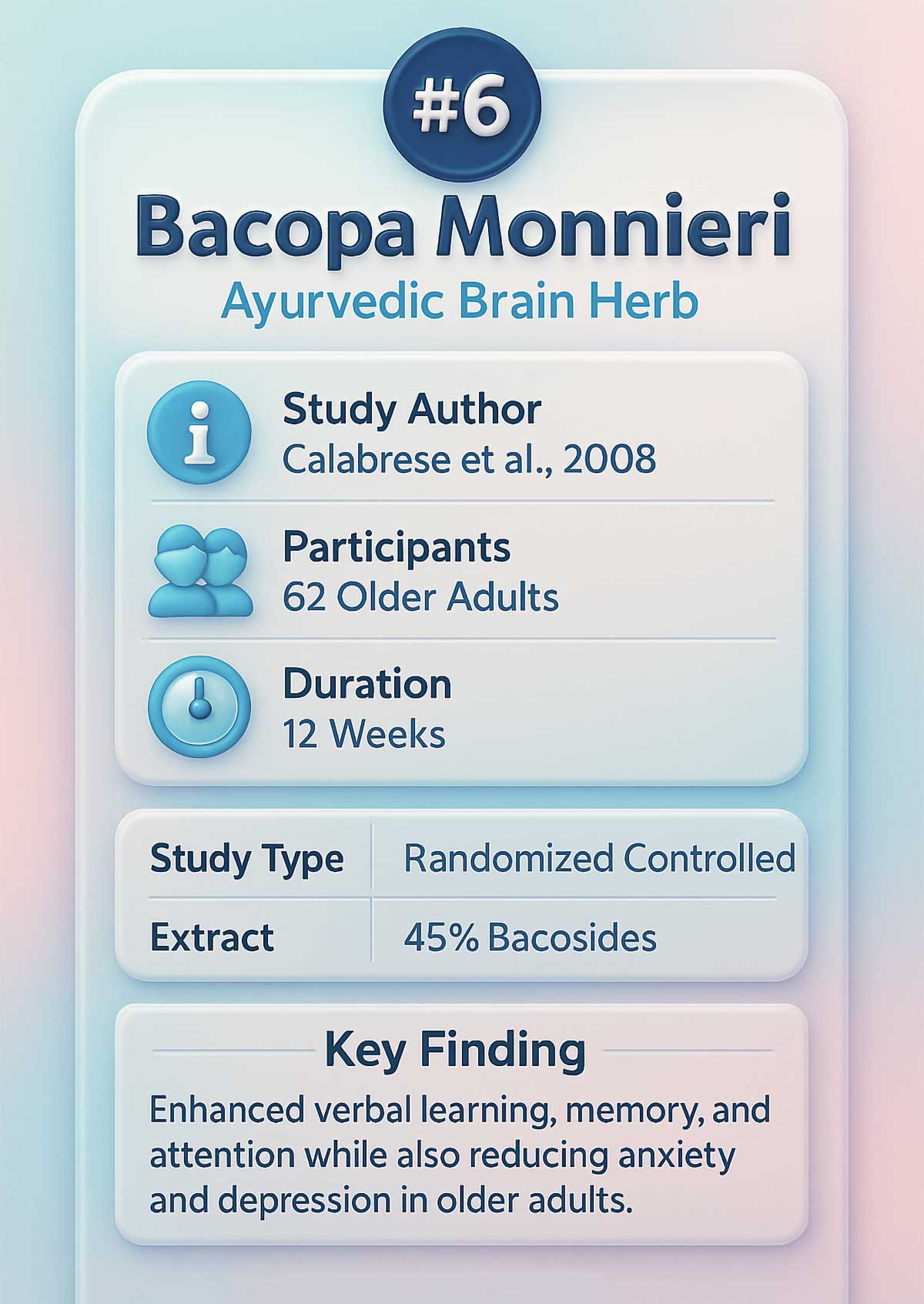
Bacopa seems to protect brain cells from stress and help them grow new connections.
Dosage & Timing
Research-Backed Dose: 300mg daily of standardized extract (45% bacosides)
Best Time: With breakfast
With Food: Yes (improves absorption and reduces nausea)
Duration: 6-12 weeks for noticeable effects
Safety & Precautions
Common Side Effects: Nausea, stomach cramps, increased bowel movements
Avoid If You Have: Slow heart rate, ulcers, urinary tract blockages
Drug Interactions: Thyroid medications, calcium channel blockers
Safe Long-Term: Generally yes, traditionally used for extended periods
Did You Know?: Bacopa is sometimes called “Brahmi,” referring to Brahma, the Hindu god of creation, reflecting its reputation for enhancing creativity and intellect.
What You Can Do
Be patient with this one. Benefits are subtle and can take 6-12 weeks to show up. Look for extracts with at least 45% bacosides. Take 300 mg daily with food.
Bottom Line: Best for those who want memory support plus anxiety relief; requires patience.
#7 Curcumin: The Anti-Inflammatory Spice
Turmeric’s Active Compound for Working Memory
Curcumin gives turmeric its yellow color. It fights inflammation and acts as an antioxidant. Both processes can harm brain cells over time.
The Evidence
In a 4-week trial of 60 healthy older adults, a special form of curcumin improved working memory and reduced tiredness. The 2015 study by Cox used a version with enhanced absorption. Participants took 400mg daily of a solid lipid curcumin formulation. They showed better performance on working memory tasks—the kind of memory you use to hold information briefly, like remembering a phone number long enough to dial it.
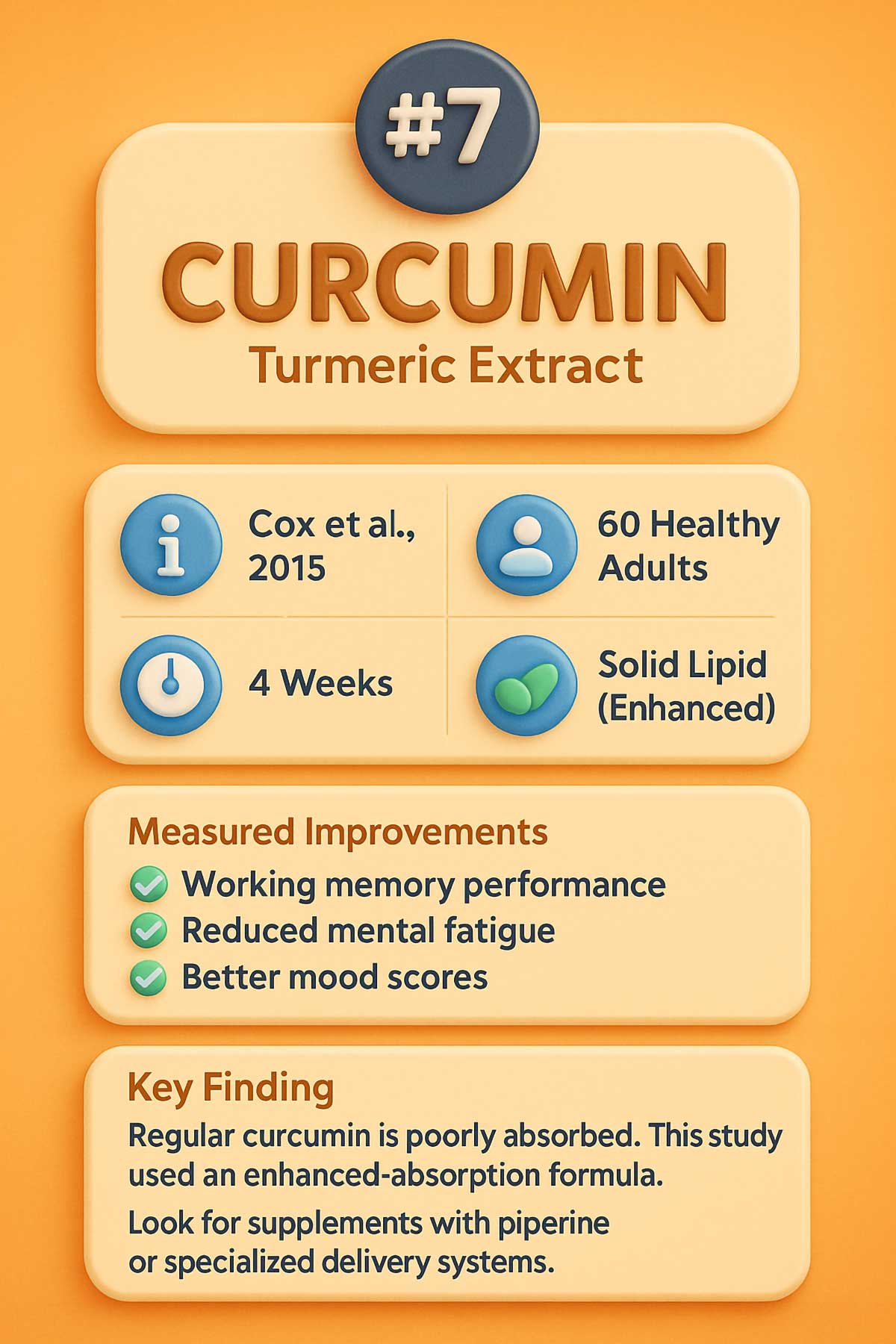
Regular curcumin is hard for your body to use. New forms get into your blood much better.
Dosage & Timing
Research-Backed Dose: 400-500mg of enhanced-absorption curcumin daily
Best Time: With largest meal
With Food: Yes (especially with fat for better absorption)
Duration: 4-6 weeks for noticeable effects
Safety & Precautions
Common Side Effects: Stomach upset, nausea, diarrhea at high doses
Avoid If You Have: Gallbladder problems, upcoming surgery
Drug Interactions: Blood thinners, diabetes medications
Safe Long-Term: Generally yes at moderate doses
Quick Tip: Look for formulations that specifically mention “enhanced bioavailability” or include piperine (black pepper extract), which can increase absorption by 2000%.
What You Can Do
Don’t just take plain turmeric powder. Look for supplements that say “enhanced bioavailability” or list piperine (black pepper extract) as an ingredient. You need about 400-500 mg of curcumin daily.
Bottom Line: Promising for working memory but requires enhanced-absorption formulas to be effective.
#8 Resveratrol: The Antioxidant Powerhouse
Found in Red Wine, But More Potent in a Pill
Resveratrol comes from grape skins, berries, and peanuts. It protects cells from damage and may help blood vessels in the brain.
The Evidence
A 26-week trial with 46 older adults found that resveratrol improved memory and increased connections in the hippocampus, a brain area vital for memory. The 2014 study by Witte used brain scans to show real changes. Participants took 200mg daily and showed better performance on memory tasks. MRI scans revealed increased connectivity in the hippocampus, suggesting structural improvements in this critical memory center.
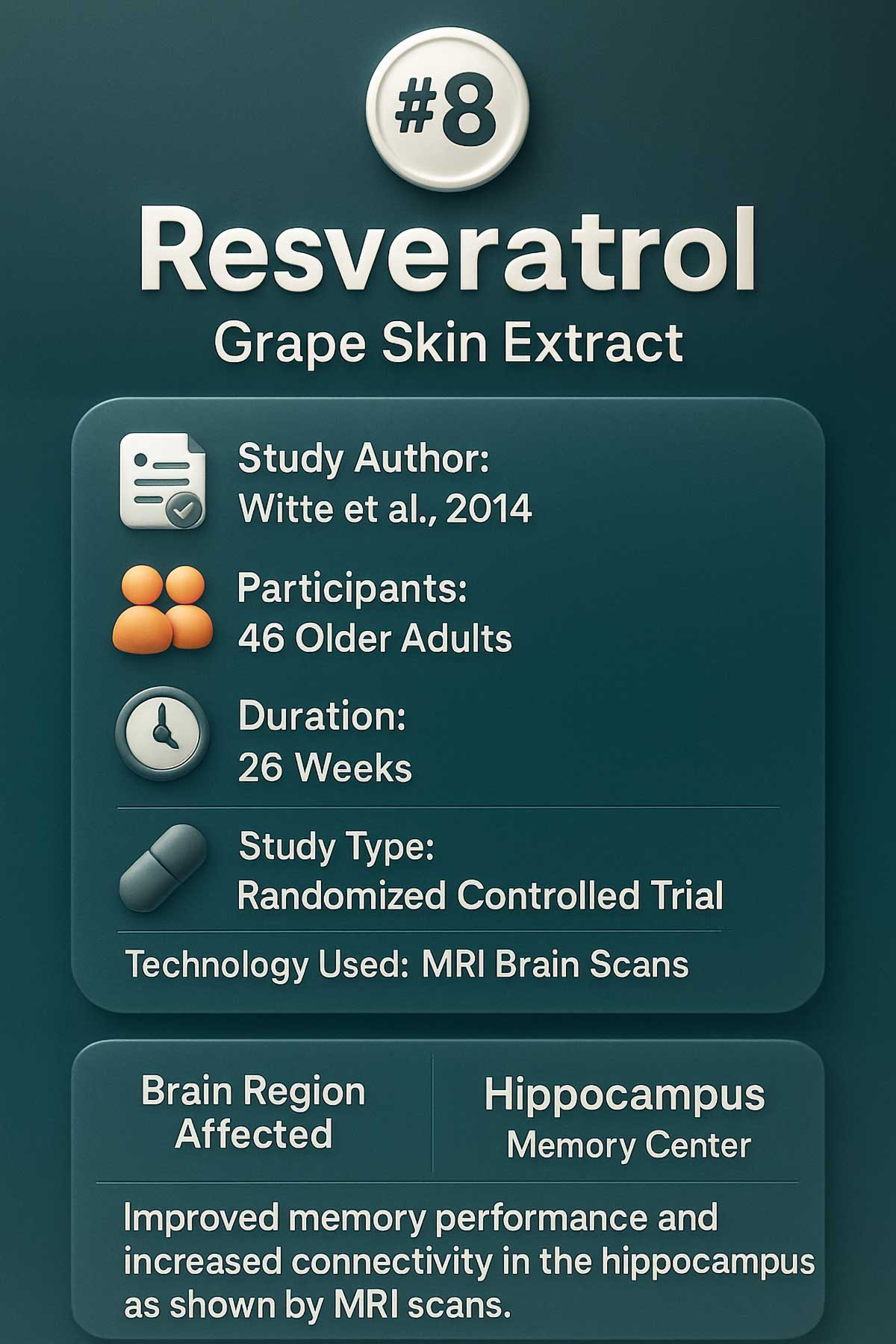
The hippocampus often shrinks with age. Resveratrol may slow that process.
Dosage & Timing
Research-Backed Dose: 150-200mg daily
Best Time: Morning or afternoon
With Food: Yes (improves absorption)
Duration: 12-26 weeks for noticeable effects
Safety & Precautions
Common Side Effects: Diarrhea, stomach upset at high doses
Avoid If You Have: Bleeding disorders, hormone-sensitive conditions
Drug Interactions: Blood thinners, certain cancer medications
Safe Long-Term: Limited long-term human data; monitor with doctor
Did You Know?: You’d need to drink about 1,000 glasses of red wine to get the amount of resveratrol used in studies. Stick with the supplement.
What You Can Do
You’d need to drink dozens of glasses of red wine to get the dose used in studies. That’s not practical or healthy. Instead, look for 150-200 mg of resveratrol in supplement form.
Bottom Line: Shows promise for memory and brain structure but requires longer supplementation period.
#9 Acetyl-L-Carnitine: The Cellular Energizer
A Modest Boost for Mild Cognitive Issues
This amino acid helps your cells make energy. It may protect nerve cells from damage as we age.
The Evidence
A review of several studies with 334 elderly patients found that Acetyl-L-Carnitine offered small but meaningful cognitive benefits for those with mild memory problems. The 2003 analysis by Montgomery examined multiple trials lasting 8 to 24 weeks. The supplement showed modest improvements in attention, memory, and verbal fluency. Benefits were most apparent in people with very early or mild cognitive changes rather than advanced issues.
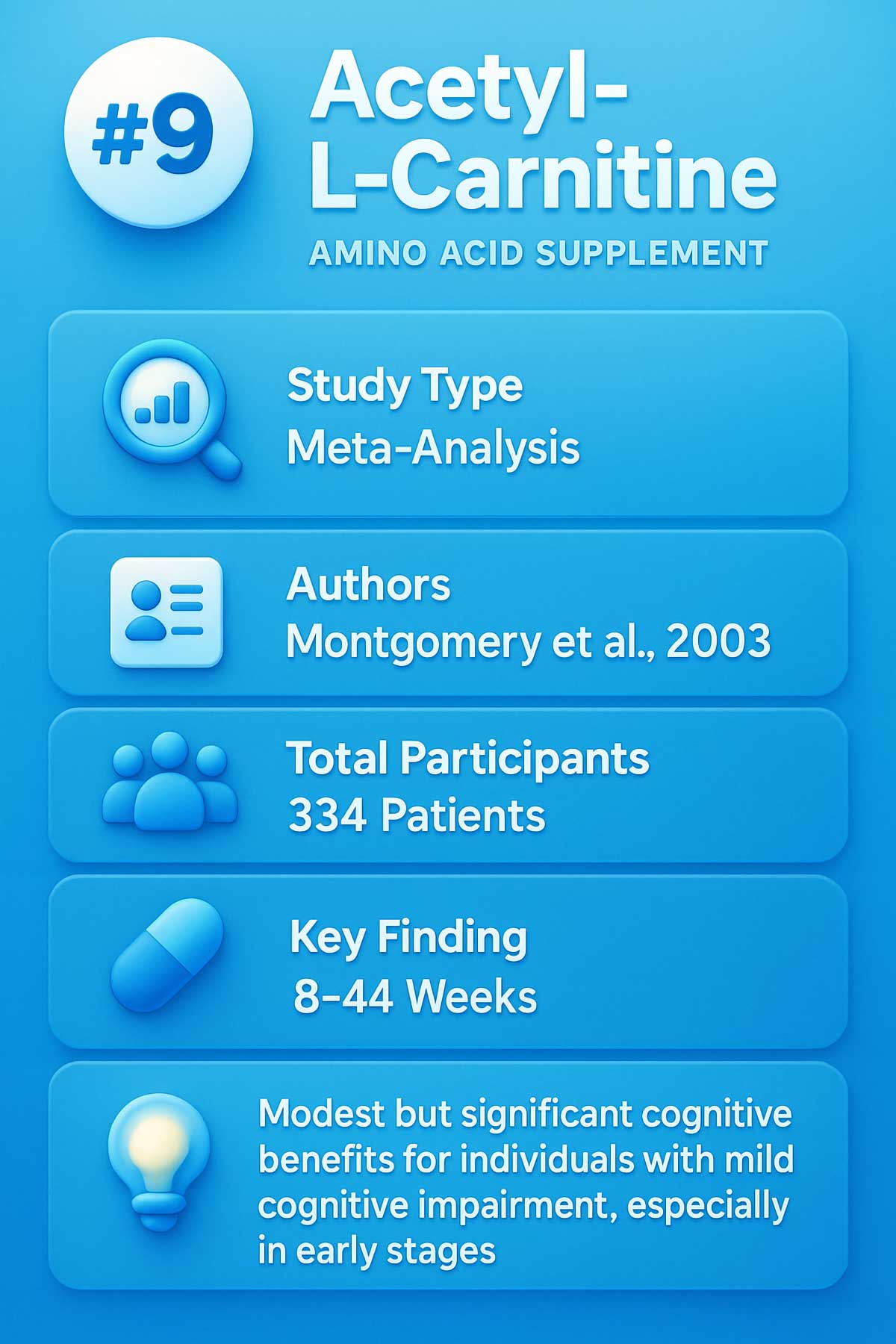
Benefits are modest. This isn’t a top choice, but it might help if you’re in the early stages of memory concerns.
Dosage & Timing
Research-Backed Dose: 1,000-2,000mg daily (split into two doses)
Best Time: Morning and early afternoon
With Food: Not required
Duration: 8-12 weeks for noticeable effects
Safety & Precautions
Common Side Effects: Nausea, vomiting, restlessness, fishy body odor
Avoid If You Have: Seizure disorders, thyroid issues
Drug Interactions: Blood thinners, thyroid medications
Safe Long-Term: Generally yes, but monitor symptoms
Quick Tip: Take on an empty stomach for better absorption, but switch to with-food if you experience nausea.
What You Can Do
If you’re just starting to notice small memory slips, this could be worth trying. Take 500-1,000 mg twice daily. Give it at least 8 weeks to work.
Bottom Line: Modest benefits for very early cognitive concerns; not as strong as higher-ranked options.
#10 Coenzyme Q10: The Mitochondrial Protector
Supporting Brain Energy, But More Research is Needed
CoQ10 helps your cells produce energy. It also protects them from damage. Your brain uses a lot of energy, so CoQ10 is important for brain health.
The Evidence
A 12-week study with 80 older adults found mild cognitive improvements and noted antioxidant benefits. Research by Yamagishi and colleagues in 2019 showed that CoQ10 supplementation improved some aspects of cognitive function and increased antioxidant activity in the blood. While CoQ10 is vital for cell health, large studies on cognitive benefits in healthy older adults are less clear than for the higher-ranked supplements.
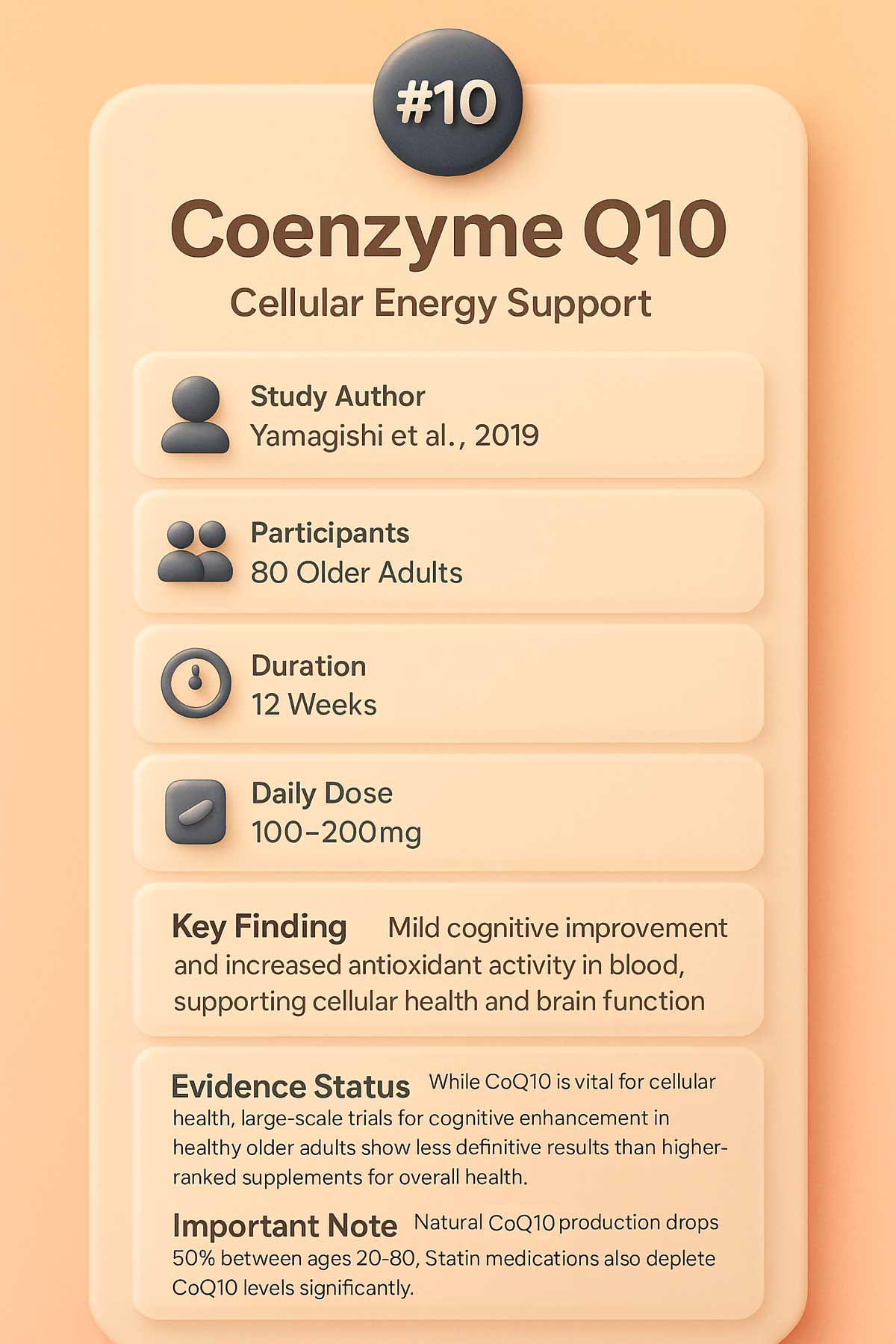
Think of CoQ10 as basic maintenance for your cells. It keeps things running, but the direct link to better memory needs more proof.
Dosage & Timing
Research-Backed Dose: 100-200mg daily of ubiquinol form
Best Time: Morning with a fatty meal
With Food: Yes (requires fat for absorption)
Duration: 8-12 weeks for noticeable effects
Safety & Precautions
Common Side Effects: Mild nausea, stomach upset, diarrhea
Avoid If You Have: No major contraindications
Drug Interactions: Blood thinners (may reduce warfarin effectiveness)
Safe Long-Term: Yes, naturally produced by the body
Did You Know?: Your body’s natural production of CoQ10 drops by about 50% between ages 20 and 80. Statin drugs also deplete CoQ10 levels.
What You Can Do
Consider CoQ10 as a general health supplement that may help your brain as a side benefit. Look for 100-200 mg daily of the ubiquinol form, which absorbs better.
Bottom Line: Better for overall cellular health than specific cognitive enhancement; good foundation supplement.
Quick Reference: Top 10 Brain Supplements at a Glance
| Rank | Supplement | Best For | Evidence Strength | Typical Dose | Time to Results |
|---|---|---|---|---|---|
| 1 | Omega-3 (DHA/EPA) | Memory & learning | ★★★★★ | 900mg DHA daily | 8-12 weeks |
| 2 | B Vitamins (B6, B12, Folate) | Slowing brain shrinkage | ★★★★★ | B12: 500mcg, B6: 20mg, Folate: 800mcg | 3-6 months |
| 3 | Phosphatidylserine | Daily task recall | ★★★★☆ | 100-300mg daily | 4-8 weeks |
| 4 | Ginkgo Biloba (EGb 761) | Blood flow & daily activities | ★★★★☆ | 120-240mg daily | 8-12 weeks |
| 5 | Citicoline | Focus & attention | ★★★★☆ | 250-500mg daily | 4-6 weeks |
| 6 | Bacopa Monnieri | Verbal learning & anxiety | ★★★☆☆ | 300mg daily | 6-12 weeks |
| 7 | Curcumin | Working memory | ★★★☆☆ | 400-500mg daily | 4-6 weeks |
| 8 | Resveratrol | Memory performance | ★★★☆☆ | 150-200mg daily | 12-26 weeks |
| 9 | Acetyl-L-Carnitine | Early mild issues | ★★☆☆☆ | 1,000-2,000mg daily | 8-12 weeks |
| 10 | Coenzyme Q10 | Cellular energy | ★★☆☆☆ | 100-200mg daily | 8-12 weeks |
Complete Dosage & Timing Reference Guide
| Supplement | Research Dose | Best Time | With Food? | Duration | Split Doses? |
|---|---|---|---|---|---|
| Omega-3 | 900mg DHA | Morning | Yes (fatty meal) | 8-12 weeks | No |
| B Vitamins | B6:20mg, B12:500mcg, Folate:800mcg | Morning | Yes | 3-6 months | No |
| Phosphatidylserine | 300mg | Throughout day | Yes | 4-8 weeks | Yes (100mg x3) |
| Ginkgo Biloba | 120-240mg | Morning & afternoon | Optional | 8-12 weeks | Yes (2 doses) |
| Citicoline | 250-500mg | Morning | Optional | 4-6 weeks | No |
| Bacopa Monnieri | 300mg | Morning | Yes | 6-12 weeks | No |
| Curcumin | 400-500mg | With largest meal | Yes (with fat) | 4-6 weeks | No |
| Resveratrol | 150-200mg | Morning/afternoon | Yes | 12-26 weeks | No |
| Acetyl-L-Carnitine | 1,000-2,000mg | Morning & afternoon | Optional | 8-12 weeks | Yes (2 doses) |
| Coenzyme Q10 | 100-200mg | Morning | Yes (fatty meal) | 8-12 weeks | No |
Safety & Interactions Matrix
| Supplement | Common Side Effects | Avoid If You Have | Key Drug Interactions | Safe Long-Term? |
|---|---|---|---|---|
| Omega-3 | Fishy burps, loose stools | Bleeding disorders, fish allergy | Blood thinners (increased bleeding) | Yes |
| B Vitamins | Nausea, yellow urine | Active cancer (high folate) | Seizure meds, methotrexate | Yes |
| Phosphatidylserine | Insomnia if taken late | None major | Alzheimer’s drugs (may enhance) | Yes |
| Ginkgo Biloba | Headache, dizziness | Bleeding disorders, surgery soon | Blood thinners, NSAIDs, SSRIs | Yes (monitor) |
| Citicoline | Headache, insomnia | None major | Parkinson’s meds (may enhance) | Yes |
| Bacopa Monnieri | Nausea, stomach cramps | Slow heart rate, ulcers | Thyroid meds, calcium blockers | Yes |
| Curcumin | Stomach upset, nausea | Gallbladder issues, surgery soon | Blood thinners, diabetes meds | Yes (moderate doses) |
| Resveratrol | Diarrhea, stomach upset | Bleeding disorders, hormone issues | Blood thinners, cancer meds | Limited data |
| Acetyl-L-Carnitine | Nausea, restlessness, fishy odor | Seizure disorders | Blood thinners, thyroid meds | Yes (monitor) |
| Coenzyme Q10 | Mild nausea, diarrhea | None major | Blood thinners (reduces warfarin) | Yes |
Supplement-Drug Interaction Checker
Select your medications to see which supplements are safe
How to Choose Quality Supplements
Not all supplements are created equal. The supplement industry isn’t tightly controlled, so quality varies widely between brands. Here’s what to look for.
Third-Party Testing Certifications
These organizations test supplements to confirm what’s on the label matches what’s in the bottle:
USP (United States Pharmacopeia): Tests for ingredient accuracy, purity, and proper manufacturing. Look for the USP Verified mark.
NSF International: Tests for contaminants and verifies label claims. Look for NSF Certified for Sport (even if you’re not an athlete—it means rigorous testing).
ConsumerLab: Independent testing company that publishes detailed reports. Products that pass earn the CL Seal of Approval.
Quality Markers Checklist
| What to Look For | Why It Matters | Red Flags to Avoid |
|---|---|---|
| Third-party certification (USP, NSF, ConsumerLab) | Confirms ingredient accuracy and purity | No testing mentioned |
| Specific ingredient amounts listed | Shows transparency and dosing | Proprietary blends with hidden amounts |
| Expiration date | Ensures potency and freshness | No date or very distant expiration |
| Contact information for manufacturer | Indicates legitimate company | Missing or fake contact info |
| Good Manufacturing Practices (GMP) certified | Ensures quality control standards | No GMP certification |
| Clear supplement facts panel | Lists all active and inactive ingredients | Vague or incomplete labeling |
| Reasonable claims | Based on research | Promises like “cure” or “miracle” |
Label Reading Tips
For Omega-3s: Check both DHA and EPA amounts. You want at least 900mg of DHA specifically, not just total omega-3s.
For B Vitamins: Look for methylcobalamin or methylfolate forms, which are easier for your body to use than cyanocobalamin and folic acid.
For Ginkgo: Must say “EGb 761” extract with 24% flavone glycosides and 6% terpene lactones.
For Curcumin: Should mention enhanced absorption like “with piperine” or “BCM-95” or “Meriva” formulations.
Price Ranges and Value
Here’s what you can expect to pay per month for quality supplements:
- Budget-Friendly ($10-20/month): B vitamins, Coenzyme Q10
- Mid-Range ($20-40/month): Omega-3s, Ginkgo, Bacopa, Acetyl-L-Carnitine
- Higher End ($40-60/month): Phosphatidylserine, Citicoline, enhanced-absorption curcumin, resveratrol
Money-Saving Tips:
- Buy larger bottles (90-day supply) for better per-dose pricing
- Compare cost per dose, not just bottle price
- Generic versions work if they have third-party testing
- Combination supplements can save money but check individual ingredient doses
Combination Supplements vs. Individual Ingredients
Pros of Combinations:
- More affordable than buying each separately
- Easier to remember (one pill vs. five)
- Pre-measured ratios
Cons of Combinations:
- Often contain lower doses than research shows effective
- Can’t adjust individual ingredients
- May include ingredients you don’t need
- Harder to identify what’s helping if you see benefits
My Take: Start with individual supplements for the first 2-3 months. Once you know what works, consider a quality combination product if it contains effective doses.
Can You Take Multiple Brain Supplements Together?
Yes, but be strategic about it. Here’s a safe stacking guide.
Supplement Stacking Guide
| Primary Supplement | Safe to Combine With | Avoid Combining With | Important Notes |
|---|---|---|---|
| Omega-3 | B vitamins, PS, Bacopa, CoQ10 | High-dose Vitamin E (over 400 IU) | Take with fatty meal; monitor if on blood thinners |
| B Vitamins | Omega-3, PS, Citicoline, CoQ10 | None | Best absorbed in morning |
| Phosphatidylserine | Omega-3, B vitamins, Ginkgo | None known | Avoid late-day dosing |
| Ginkgo Biloba | B vitamins, Bacopa, CoQ10 | Multiple blood thinners | Stop 2 weeks before surgery |
| Citicoline | B vitamins, Omega-3, Bacopa | High-dose choline sources | May cause headache if combined with too much choline |
| Bacopa Monnieri | Omega-3, Ginkgo, Curcumin | None known | Take with food to reduce nausea |
| Curcumin | Omega-3, Bacopa, Resveratrol | Multiple blood thinners | Enhanced absorption forms only |
| Resveratrol | Curcumin, Omega-3, CoQ10 | Multiple blood thinners | Monitor bleeding risk |
| Acetyl-L-Carnitine | CoQ10, B vitamins | None known | May cause restlessness if taken late |
| Coenzyme Q10 | Omega-3, B vitamins, Resveratrol | Warfarin (reduces effectiveness) | Take with fat for absorption |
Recommended Stacking Combinations
The Foundation Stack (Best for most people over 50):
- Omega-3: 900mg DHA daily
- B Vitamins: Full complex daily
- CoQ10: 100-200mg daily
Cost: $35-50/month | Start here if you’re new to supplements
The Memory Enhancer Stack:
- Omega-3: 900mg DHA daily
- Phosphatidylserine: 300mg daily
- B Vitamins: Full complex daily
Cost: $50-70/month | Best for everyday memory concerns
The Cognitive Support Stack:
- Omega-3: 900mg DHA daily
- Citicoline: 250-500mg daily
- Ginkgo Biloba: 120mg twice daily
Cost: $60-80/month | Best for focus and mental clarity
The Neuroprotection Stack:
- Omega-3: 900mg DHA daily
- Curcumin: 500mg daily
- Resveratrol: 200mg daily
- CoQ10: 200mg daily
Cost: $70-90/month | Best for long-term brain health
How to Add Supplements Safely
Don’t start everything at once. Your body needs time to adjust, and you need to know what’s helping.
Week 1-2: Start with omega-3s alone Week 3-4: Add B vitamins if no issues Week 5-6: Add one more based on your primary concern Week 7-8: Assess and add a fourth if desired
Keep notes on changes you notice. This helps you and your doctor figure out what’s working.
Your 12-Week Brain Health Action Plan
Starting a supplement routine can feel overwhelming. This plan breaks it down into manageable steps.
Weeks 1-4: Foundation Phase
Start: Omega-3s (900mg DHA daily)
Why Start Here: Strongest evidence, safest profile, builds brain structure.
Add to Your Life:
- Eat fatty fish twice weekly
- Start a 10-minute daily walk
- Do one crossword or Sudoku daily
- Go to bed at the same time each night
Track: Energy levels, mood, sleep quality
When to Contact Doctor: Unusual bleeding, severe stomach upset
Weeks 5-8: Enhancement Phase
Add: B Vitamins (if homocysteine is elevated) OR Phosphatidylserine (for memory)
Why Add Now: Your body has adjusted to omega-3s; ready for the next layer.
Add to Your Life:
- Increase walking to 20 minutes daily
- Add one serving of leafy greens daily
- Try a new mentally stimulating activity
- Practice 5 minutes of deep breathing daily
Track: Memory improvements, recall speed, word-finding
Reassess: Are you noticing any changes? Write them down.
Weeks 9-12: Optimization Phase
Add: Third supplement based on your specific needs:
- Citicoline for focus issues
- Ginkgo for daily task performance
- Bacopa for anxiety plus memory
Why Add Now: You’ve built a foundation and can assess what else might help.
Add to Your Life:
- Walk 30 minutes most days
- Add strength training twice weekly
- Engage in social activity once weekly
- Aim for 7-8 hours of sleep nightly
Track: Overall cognitive function, confidence, independence
Evaluate: Time to review with your doctor. Bring your notes.
Beyond 12 Weeks: Maintenance
Continue: What’s working based on your notes and observations.
Adjust: Drop supplements that haven’t shown benefits after 12 weeks.
Monitor: Check in with your doctor every 6 months for blood work and cognitive assessment.
Refine: Your needs may change. Stay flexible and willing to adjust your routine.
Brain-Healthy Meal Plan: 7 Days of Cognitive Support
Food comes first. These meals pack the nutrients your brain needs, including omega-3s, B vitamins, antioxidants, and anti-inflammatory compounds.
Monday
Breakfast: Scrambled eggs with spinach and whole grain toast
- Brain Benefits: Eggs provide choline and B vitamins; spinach adds folate
Lunch: Salmon salad with mixed greens, walnuts, and olive oil dressing
- Brain Benefits: 1,200mg omega-3s from salmon; walnuts add extra healthy fats
Dinner: Grilled chicken with roasted broccoli and quinoa
- Brain Benefits: B vitamins from chicken; antioxidants from broccoli
Tuesday
Breakfast: Greek yogurt with blueberries and ground flaxseed
- Brain Benefits: Blueberries provide antioxidants; flaxseed adds omega-3s
Lunch: Lentil soup with kale and carrots
- Brain Benefits: Folate from lentils; vitamin A from carrots supports brain health
Dinner: Baked mackerel with sweet potato and green beans
- Brain Benefits: 2,300mg omega-3s from mackerel; B6 from sweet potato
Wednesday
Breakfast: Oatmeal topped with strawberries and chia seeds
- Brain Benefits: Chia seeds provide omega-3s; oats support steady blood sugar
Lunch: Turkey and avocado wrap with whole grain tortilla
- Brain Benefits: B vitamins from turkey; healthy fats from avocado
Dinner: Sardines on whole grain crackers with tomato salad
- Brain Benefits: 1,800mg omega-3s from sardines; lycopene from tomatoes
Thursday
Breakfast: Smoothie with spinach, banana, almond butter, and flaxseed
- Brain Benefits: Magnesium from spinach and almond butter supports nerve function
Lunch: Chicken and vegetable stir-fry with brown rice
- Brain Benefits: B vitamins from chicken; varied antioxidants from colorful veggies
Dinner: Grilled trout with asparagus and wild rice
- Brain Benefits: 1,100mg omega-3s from trout; folate from asparagus
Friday
Breakfast: Whole grain toast with mashed avocado and poached egg
- Brain Benefits: Healthy fats from avocado; choline from egg
Lunch: White bean and vegetable soup with whole grain roll
- Brain Benefits: Folate from beans; fiber supports gut-brain axis
Dinner: Baked salmon with Brussels sprouts and fingerling potatoes
- Brain Benefits: 1,500mg omega-3s from salmon; vitamin K from Brussels sprouts
Saturday
Breakfast: Cottage cheese with sliced peaches and walnuts
- Brain Benefits: B12 from cottage cheese; omega-3s from walnuts
Lunch: Tuna salad on mixed greens with olive oil dressing
- Brain Benefits: 900mg omega-3s from tuna; vitamin E from olive oil
Dinner: Roasted chicken thighs with roasted root vegetables
- Brain Benefits: B vitamins from chicken; antioxidants from colorful vegetables
Sunday
Breakfast: Vegetable omelet with whole grain toast
- Brain Benefits: Choline and B vitamins from eggs; folate from vegetables
Lunch: Minestrone soup with cannellini beans and whole grain bread
- Brain Benefits: Folate from beans; antioxidants from tomatoes
Dinner: Grilled mackerel with roasted cauliflower and quinoa
- Brain Benefits: 2,000mg omega-3s from mackerel; choline from cauliflower
Shopping List Essentials: Wild-caught fatty fish (salmon, mackerel, sardines, trout), eggs, leafy greens, berries, nuts and seeds, whole grains, beans and lentils, colorful vegetables
Brain-Boosting Recipes
Omega-3 Berry Brain Booster Smoothie
Prep Time: 5 minutes | Serves: 1
Ingredients:
- 1 cup unsweetened almond milk
- 1/2 cup frozen blueberries
- 1/2 cup frozen strawberries
- 1 tablespoon ground flaxseed
- 1 tablespoon almond butter
- 1/2 banana
- Handful of spinach (optional)
Instructions:
- Add all ingredients to blender
- Blend until smooth
- Pour and enjoy immediately
Brain Benefits Per Serving:
- 2,300mg omega-3 ALA (converts partially to DHA)
- High in antioxidants from berries
- B vitamins from almond butter
- Folate from spinach
Nutrition: 280 calories, 11g fat, 38g carbs, 9g fiber, 7g protein
Golden Glow Curcumin Smoothie
Prep Time: 5 minutes | Serves: 1
Ingredients:
- 1 cup coconut milk (full-fat for better curcumin absorption)
- 1/2 cup frozen mango
- 1/2 teaspoon turmeric powder
- 1/4 teaspoon black pepper (enhances curcumin absorption)
- 1/2 teaspoon fresh grated ginger
- 1 tablespoon honey
- 1/2 banana
Instructions:
- Combine all ingredients in blender
- Blend until creamy and smooth
- Serve immediately
Brain Benefits Per Serving:
- Natural curcumin from turmeric
- Black pepper increases curcumin absorption by 2000%
- Anti-inflammatory compounds
- Healthy fats aid nutrient absorption
Nutrition: 310 calories, 15g fat, 44g carbs, 4g fiber, 3g protein
Green Memory Machine Smoothie
Prep Time: 5 minutes | Serves: 1
Ingredients:
- 1 cup unsweetened green tea (cooled)
- 1 cup spinach
- 1/2 avocado
- 1/2 cup frozen pineapple
- 1 tablespoon chia seeds
- 1 teaspoon honey
- Ice cubes
Instructions:
- Brew green tea and let cool
- Add all ingredients to blender
- Blend until smooth
- Add ice for desired consistency
Brain Benefits Per Serving:
- L-theanine from green tea supports focus
- Omega-3s from chia and avocado
- Folate from spinach
- Healthy fats improve nutrient absorption
Nutrition: 245 calories, 13g fat, 30g carbs, 11g fiber, 5g protein
Baked Herb Salmon (Omega-3 Rich)
Prep Time: 10 minutes | Cook Time: 15 minutes | Serves: 2
Ingredients:
- 2 salmon fillets (6 oz each)
- 2 tablespoons olive oil
- 2 cloves garlic, minced
- 1 tablespoon fresh dill, chopped
- 1 lemon, sliced
- Salt and pepper to taste
Instructions:
- Preheat oven to 400°F
- Place salmon on foil-lined baking sheet
- Mix olive oil, garlic, and dill
- Brush mixture over salmon
- Top with lemon slices
- Bake 12-15 minutes until flaky
- Season with salt and pepper
Brain Benefits Per Serving:
- 2,200mg omega-3s (DHA + EPA)
- Vitamin D for brain health
- High-quality protein
- Anti-inflammatory compounds
Nutrition: 380 calories, 24g fat, 2g carbs, 0g fiber, 39g protein
Sardine Salad Sandwich
Prep Time: 10 minutes | Serves: 2
Ingredients:
- 1 can sardines in olive oil, drained
- 2 tablespoons Greek yogurt
- 1 tablespoon Dijon mustard
- 2 tablespoons red onion, finely diced
- 2 tablespoons celery, finely diced
- 1 tablespoon fresh parsley, chopped
- 4 slices whole grain bread
- Lettuce and tomato for serving
Instructions:
- Mash sardines in a bowl
- Mix in yogurt, mustard, onion, celery, and parsley
- Season with salt and pepper
- Spread on whole grain bread
- Add lettuce and tomato
- Serve immediately
Brain Benefits Per Serving:
- 1,800mg omega-3s (DHA + EPA)
- Vitamin B12 for nerve health
- Calcium for neurotransmitter function
- Complete protein
Nutrition: 320 calories, 14g fat, 26g carbs, 5g fiber, 24g protein
Simple Mackerel Pâté
Prep Time: 15 minutes | Serves: 4
Ingredients:
- 2 cans mackerel in olive oil, drained
- 4 oz cream cheese, softened
- 2 tablespoons lemon juice
- 1 tablespoon horseradish
- 2 tablespoons fresh chives, chopped
- 1/4 teaspoon smoked paprika
- Salt and pepper to taste
Instructions:
- Combine mackerel and cream cheese in food processor
- Add lemon juice, horseradish, and seasonings
- Pulse until smooth but still slightly chunky
- Stir in chives
- Refrigerate 1 hour before serving
- Serve with whole grain crackers or vegetable sticks
Brain Benefits Per Serving:
- 2,400mg omega-3s (DHA + EPA)
- Vitamin D and B12
- Selenium for antioxidant protection
- Healthy fats
Nutrition: 210 calories, 15g fat, 3g carbs, 0g fiber, 18g protein
Common Questions About Brain Supplements
Can I take multiple brain supplements together?
Yes, but start slowly. Begin with one supplement and add others every 2-3 weeks. This helps you identify what works and reduces the risk of side effects. The most researched combinations include omega-3s with B vitamins, or omega-3s with phosphatidylserine. Always check the safety matrix in this article for specific combinations.
How long before I see results?
It varies by supplement. Citicoline may improve focus within 2-4 weeks. Omega-3s typically take 8-12 weeks for memory benefits. B vitamins need 3-6 months to show effects on brain structure. Be patient and consistent. Your brain didn’t change overnight, and supplements won’t fix things instantly either.
Are brain supplements safe for long-term use?
Most are, but it depends on the supplement. Omega-3s, B vitamins, and phosphatidylserine have been used safely for years in studies. Others like resveratrol have limited long-term data. Check with your doctor annually and get blood work to monitor your health. Stop any supplement if you develop new symptoms.
Do brain supplements really work or is it placebo?
The supplements ranked highest in this article have solid evidence from randomized controlled trials—the gold standard of research. These studies compared supplements to placebos, so the benefits aren’t just in people’s heads. That said, not everyone responds the same way. What works for one person may not work for another due to genetics, diet, and other factors.
What’s the difference between prescription and over-the-counter brain supplements?
Prescription medications for memory (like donepezil) treat diagnosed conditions such as Alzheimer’s disease. They’re more potent and have more side effects. Over-the-counter supplements support normal brain function and may help with age-related changes. They’re not treatments for disease. If you have diagnosed cognitive impairment, you need prescription medication, not supplements.
Can younger adults benefit from these supplements?
Most research focuses on adults over 50 with age-related memory concerns. Young, healthy adults may not see the same benefits. The exception is omega-3s, which benefit brain health at any age. If you’re under 50 with memory concerns, see a doctor first to rule out other causes like sleep problems, stress, depression, or vitamin deficiencies.
Are there side effects I should know about?
Every supplement can cause side effects. The most common are mild digestive issues like nausea or diarrhea. Some supplements interact with medications—especially blood thinners. Check the safety matrix in this article for specifics. Start with low doses and increase gradually. Stop immediately if you develop severe symptoms and call your doctor.
Should I take breaks from brain supplements?
For most supplements, continuous use is fine and often more effective. Your brain benefits from steady support. The exception might be if you’re taking high doses or multiple supplements. Some people cycle off every few months to assess whether they still need them. Discuss your specific situation with your doctor.
Can supplements reverse memory loss?
No supplement can reverse significant memory loss or cure dementia. The research shows they may slow decline or support normal age-related changes. If you’re experiencing serious memory problems that affect daily life, you need medical evaluation, not supplements. Don’t let supplements delay proper diagnosis and treatment.
What if I’m already taking medications?
Many supplements interact with medications. Blood thinners are especially problematic with omega-3s, ginkgo, curcumin, and resveratrol. Diabetes medications may interact with curcumin. Always tell your doctor about every supplement you take. Bring the bottles to your appointments so your doctor can check for interactions.
Supplements vs. Nootropics: What’s the Difference?
You may have heard the term “nootropics” and wondered how they differ from the supplements in this article.
Nootropics are substances that claim to boost brain performance in healthy people. The term covers everything from caffeine to prescription drugs to unregulated compounds. Many nootropics lack solid research, especially long-term safety data.
The supplements in this article have been studied specifically in older adults with age-related memory concerns. They have safety data spanning months to years. They support normal brain function rather than promising superhuman cognitive powers.
Key Differences:
- Target audience: Nootropics target healthy young adults wanting an edge; these supplements target age-related changes
- Research quality: These supplements have randomized controlled trials; many nootropics have minimal human data
- Safety profiles: These supplements have established safety records; some nootropics have unknown long-term effects
- Claims: These supplements support normal function; nootropics often promise enhancement beyond normal
If you see products marketed as “smart drugs” or “cognitive enhancers” with extreme claims, be skeptical. Stick with well-researched options like those ranked in this article.
Natural vs. Synthetic: Does It Matter?
Some supplements come in natural forms, others are synthetic. Here’s what you need to know.
Omega-3s: Can be fish-derived or algae-derived (vegan). Both work, but check the DHA content regardless of source.
B Vitamins: Natural forms like methylcobalamin (B12) and methylfolate are often better absorbed than synthetic cyanocobalamin and folic acid. Worth paying extra for.
Phosphatidylserine: Originally from cow brains, now from soy or sunflower. The plant sources are safer and work just as well.
Ginkgo: Standardized extracts (like EGb 761) are more reliable than raw herb powder. The extraction process ensures consistent active compounds.
Curcumin: Raw turmeric powder is poorly absorbed. Enhanced formulations (synthetic modifications) work much better.
The bottom line: Natural isn’t always better. What matters is bioavailability (can your body use it?) and consistent potency. Choose based on research, not marketing claims about “natural” sources.
Supplements to Avoid After 50
Not all supplements marketed for brain health are helpful. Some may cause more harm than good for older adults.
Huperzine A: May interact with Alzheimer’s medications and cause excessive acetylcholine buildup. Can cause serious side effects like slow heart rate and increased stomach acid.
DMAE (Dimethylaminoethanol): Limited human research and may worsen certain brain conditions. Some studies suggest it could be harmful in Alzheimer’s disease.
Vinpocetine: Can thin blood excessively when combined with other supplements or medications. May lower blood pressure dangerously in some people.
Idebenone: Synthetic compound with minimal research in healthy aging adults. Most studies focus on rare genetic conditions.
Piracetam: Not approved in the US. Limited quality research in age-related memory concerns. May interact with blood thinners.
Very high doses of Vitamin E (over 400 IU daily): Studies show increased mortality risk in older adults at high doses. May increase bleeding risk when combined with omega-3s.
Stick with the well-researched options in this article. They have decades of safety data and solid evidence for benefits.
Budget Guide: Prioritizing Supplements on a Fixed Income
Quality brain supplements cost money. If your budget is tight, here’s how to prioritize.
If You Can Afford Only One Supplement ($15-25/month)
Choose: Omega-3s (with at least 900mg DHA)
Why: Strongest evidence, broadest benefits, helps heart and joints too. Get the most value for your dollar.
Cost-Saving Tip: Buy a 90-day supply for better pricing. Store in the fridge to prevent spoilage.
If You Can Afford Two Supplements ($30-45/month)
Choose: Omega-3s + B Vitamins
Why: This combination addresses two different mechanisms—building brain structure and lowering homocysteine. B vitamins are affordable and last a long time.
Cost-Saving Tip: Generic B-complex vitamins work fine if they contain the amounts listed in this article.
If You Can Afford Three Supplements ($50-70/month)
Choose: Omega-3s + B Vitamins + Phosphatidylserine OR Citicoline
Why: Adds memory support (PS) or focus enhancement (citicoline) to your foundation. Choose based on your primary concern.
Cost-Saving Tip: Shop online retailers for better prices than local stores. Subscribe-and-save options often offer 10-15% discounts.
Budget-Friendly Alternatives
Instead of expensive omega-3 supplements: Eat canned sardines or mackerel twice weekly. A can costs $2-3 and provides more omega-3s than most supplements.
Instead of phosphatidylserine supplements: Eat more soybeans, white beans, and sunflower seeds. You won’t get supplement-level doses, but every bit helps.
Instead of curcumin supplements: Use turmeric liberally in cooking with black pepper. Add healthy fats (olive oil, coconut milk) to improve absorption.
Instead of resveratrol supplements: Eat more grapes, berries, and peanuts. Modest amounts provide antioxidant benefits.
Generic vs. Brand Name
Generic supplements work fine if they have:
- Third-party testing certification
- Correct dosages of active ingredients
- Good manufacturing practices (GMP) certification
Don’t pay extra for fancy packaging or celebrity endorsements. Do pay extra for quality testing and proper forms of nutrients (like methylated B vitamins).
Monthly Cost Breakdown by Priority
Essential Foundation ($20-35/month):
- Omega-3: $15-25
- B-Complex: $5-10
Enhanced Support ($50-70/month):
- Omega-3: $15-25
- B-Complex: $5-10
- Phosphatidylserine: $30-35
Comprehensive Plan ($80-120/month):
- Omega-3: $15-25
- B-Complex: $5-10
- Phosphatidylserine: $30-35
- Citicoline: $20-30
- Ginkgo: $10-20
Choose what fits your budget. Something is better than nothing.
Warning Signs You Need to See a Doctor
Supplements support normal brain aging. They don’t treat disease. Watch for these red flags that need medical attention:
Seek immediate care if you experience:
- Sudden confusion or disorientation
- Inability to recognize familiar people or places
- Sudden severe headache with memory loss
- Memory loss after a fall or head injury
- Hallucinations or delusions
- Sudden personality changes
Schedule a doctor visit soon if you notice:
- Forgetting important events or appointments regularly
- Getting lost in familiar places
- Difficulty managing finances or medications
- Trouble following conversations or finding words
- Changes in judgment or decision-making
- Withdrawal from social activities
- Mood changes like depression or anxiety
- Memory problems that interfere with daily life
When supplements aren’t enough:
- You’ve tried supplements for 3-6 months with no improvement
- Your memory is getting worse despite supplements
- Family members express concern about your memory
- You’re having trouble living independently
Don’t let supplements delay proper medical care. They’re tools for supporting healthy aging, not treatments for cognitive decline or dementia.
Myths vs. Facts About Brain Supplements
Let’s clear up common misconceptions.
Myth: More is better. If 100mg helps, 500mg will help more.
Fact: Supplements have optimal doses based on research. Higher doses can cause side effects without extra benefits. Stick to researched amounts.
Myth: Natural supplements are always safe.
Fact: Natural doesn’t mean harmless. St. John’s wort is natural but interacts with dozens of medications. Even omega-3s increase bleeding risk at high doses. Always check safety information.
Myth: You’ll feel the effects immediately.
Fact: Brain supplements take weeks to months to work. You’re rebuilding and protecting structures, not getting a quick stimulant effect. Be patient.
Myth: One supplement will fix everything.
Fact: Your brain needs multiple nutrients and lifestyle factors. No single supplement addresses all aspects of brain health. That’s why combination approaches work better.
Myth: If it works for my friend, it’ll work for me.
Fact: Genetics, diet, medications, and health conditions affect how you respond to supplements. What helps one person may not help another. You need to try and assess for yourself.
Myth: Expensive supplements are better quality.
Fact: Price doesn’t always indicate quality. Check for third-party testing, proper doses, and good manufacturing practices. Some expensive brands pay for marketing, not quality.
Myth: You need to take breaks or you’ll build tolerance.
Fact: These aren’t drugs that cause tolerance. Consistent use is usually more effective than cycling on and off. Your brain benefits from steady nutritional support.
Myth: Brain supplements can reverse Alzheimer’s or dementia.
Fact: No supplement reverses these diseases. Some may slow progression slightly in early stages, but they’re not treatments. Don’t substitute supplements for proper medical care.
Red Flags to Report to Your Doctor
Action: If you checked any boxes, contact your doctor before your next scheduled visit.
Lifestyle Habits That Boost Brain Health
Supplements work best when combined with healthy habits. Here’s what makes the biggest difference.
Exercise: The Most Powerful Brain Protector
What the research shows: A 2011 study by Erickson and colleagues found that older adults who walked 40 minutes three times per week for one year actually increased the size of their hippocampus by 2%. The control group showed normal age-related shrinkage.
Your action plan:
- Walk 30 minutes most days of the week
- Add strength training twice weekly (bodyweight exercises count)
- Include balance work (tai chi, yoga, standing on one foot)
- Any movement counts—gardening, dancing, swimming
Why it works: Exercise increases blood flow to the brain, promotes new brain cell growth, and reduces inflammation.
Sleep: When Your Brain Cleans House
What the research shows: During deep sleep, your brain clears out waste products including proteins linked to Alzheimer’s disease. A 2013 study by Xie and colleagues showed that the brain’s cleaning system is 10 times more active during sleep.
Your action plan:
- Aim for 7-8 hours nightly
- Keep a consistent sleep schedule (same bedtime and wake time)
- Make your bedroom cool, dark, and quiet
- Avoid screens 1 hour before bed
- Limit caffeine after 2 PM
Why it works: Sleep deprivation impairs memory formation and prevents brain cleaning processes.
Social Connection: Use It or Lose It
What the research shows: A 2012 study by James and colleagues following 1,138 older adults for 12 years found that those with larger social networks had slower rates of cognitive decline.
Your action plan:
- Call or visit with friends or family weekly
- Join a club, class, or volunteer group
- Attend religious or community gatherings
- Take a class to learn something new with others
- Help others—volunteering benefits your brain too
Why it works: Social interaction stimulates multiple brain areas, reduces stress, and provides mental stimulation.
Mental Stimulation: Challenge Your Brain
What the research shows: The ACTIVE trial, published in 2014, showed that just 10 sessions of brain training improved cognitive function for up to 10 years in older adults.
Your action plan:
- Learn a new skill (language, instrument, craft)
- Do puzzles (crosswords, Sudoku, jigsaw)
- Play strategy games (chess, bridge, board games)
- Read challenging books
- Take classes on topics that interest you
Why it works: Novel, challenging activities build new brain connections and strengthen existing ones.
Diet: Feed Your Brain
What the research shows: The MIND diet study by Morris and colleagues in 2015 showed that older adults who followed this eating pattern had cognitive function equivalent to being 7.5 years younger.
Your action plan:
- Eat fatty fish twice weekly
- Have berries at least twice weekly
- Eat leafy greens daily
- Use olive oil as your main fat
- Limit red meat, butter, cheese, and sweets
- Include beans, nuts, and whole grains daily
Why it works: These foods provide the building blocks, fuel, and protection your brain needs.
Stress Management: Protect Your Hippocampus
What the research shows: Chronic stress shrinks the hippocampus and impairs memory formation. A 2018 study by Echouffo-Tcheugui and colleagues found that high cortisol levels were linked to smaller brain volume and worse memory.
Your action plan:
- Practice deep breathing for 5 minutes daily
- Try meditation or mindfulness
- Spend time in nature
- Do activities you enjoy
- Talk to friends or a counselor about worries
- Limit news and social media if they stress you out
Why it works: Lowering stress hormones protects brain structure and improves memory function.
Final Thoughts: Your Action Plan Recap
You’ve learned about 10 brain supplements ranked by evidence. Now it’s time to take action.
Start Here
The top three supplements have the strongest science: Omega-3s, B vitamins, and phosphatidylserine. If you’re just starting out, focus on these first.
Get tested: Ask your doctor to check homocysteine levels and vitamin B12. This helps you know if B vitamins should be a priority.
Choose quality: Look for third-party testing (USP, NSF, ConsumerLab). Don’t waste money on low-quality products.
Be patient: Most supplements take 8-12 weeks to show benefits. Keep notes on changes you notice.
Remember the Foundation
No supplement can replace a healthy lifestyle. Your brain needs:
- Regular exercise (30 minutes most days)
- Quality sleep (7-8 hours nightly)
- Social connections (weekly interactions)
- Mental stimulation (daily challenges)
- Healthy diet (Mediterranean or MIND diet pattern)
- Stress management (daily practice)
These habits form the base. Supplements add to that base but can’t replace it.
Talk to Your Doctor
Before starting any new supplement:
- Discuss your medications and health conditions
- Get appropriate blood tests
- Create a monitoring plan
- Set realistic expectations
Bring this article to your appointment. Show your doctor which supplements interest you and why.
Track Your Progress
Use the tracker in this article to monitor changes over 12 weeks. Write down:
- What supplements you’re taking
- Any side effects
- Improvements you notice
- Questions for your doctor
This information helps you and your doctor figure out what’s working.
When to Reassess
After 12 weeks, evaluate:
- Are you noticing improvements?
- Are the supplements worth the cost?
- Do you need to adjust doses or change supplements?
- Is it time to add or drop anything?
Be honest with yourself. If something’s not helping after 3 months, it’s okay to stop and try something else.
Stay Hopeful but Realistic
Your brain has carried you through life. Now it needs extra support. The supplements in this article can help, but they’re not magic pills. They work best as part of a complete approach to brain health.
Small improvements add up. Better word-finding, sharper focus, improved recall of where you put things—these matter. They help you stay independent and engaged with life.
You’re taking charge of your brain health. That’s something to feel good about.
Your brain has decades of service ahead. Give it the support it needs to stay sharp for years to come.


